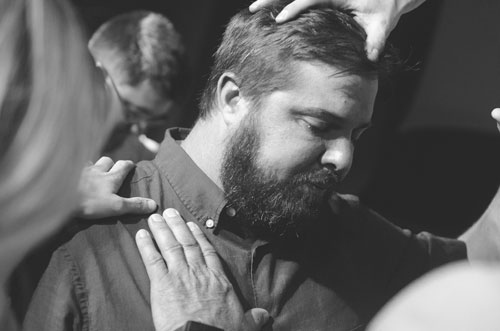Altars and Tents
/0 Comments/in Weekly Devotional/by David GuzikAnd Abram moved from there to the mountain east of Bethel, and he pitched his tent with Bethel on the west and Ai on the east; there he built an altar to the Lord and called on the name of the Lord. (Genesis 12:8)
God had told Abram to get out of his country and go to the place God would show him. God’s commands rarely come with reasons, though sometimes we feel the right to demand them.
Though God rarely gives reasons, He often gives promises with His commands. Without going into great detail, God promised Abram a land, a nation, and a blessing. However, if he was to make them his own, he had to follow through and be obedient to God. Though his full obedience was a slow in coming, it came.

True faith will embrace both God’s promise and His command. The great Scottish preacher Alexander Maclaren said: “Some people’s faith says that it delights in God’s promises, but it does not delight in His commandments. That is no faith at all. Whoever takes God at His word, will take all His words. There is no faith without obedience; there is no true obedience without faith.”
Before Abram’s faith could fully inherit the promise of receiving a land, it had to obey God’s command to separate from his old country and his family. God still requires that those who will receive new life in Jesus separate themselves from the damaging aspects of their old life. You really can’t have it both ways. Either your faith will separate you from the world, or the world will separate you from your faith and your God.
Genesis 12:8 shows there are two emblems that can always be associated with a true man or woman of faith: the tent and the altar.
The tent speaks of someone who lives as a traveler; a person who is a sojourner or a pilgrim. They recognize that the land they are in is not their home; therefore they live in a tent, not a house. Every true man and woman of faith recognizes that this world is not their home; they are only visiting this planet. They are citizens of a better country, of a New Jerusalem that will come down from heaven, not one that can be built on this earth. They live and work on the earth, but always with the consciousness that they are really aliens and pilgrims; they will one day travel on to their true country.
The altar is the other mark of the man or woman of faith. It speaks of a life of worship and sacrifice. Though this world is not our own, while we are here we will worship our God, and give our life to Him as a sacrifice of service. The world will see our altars of worship, and they will testify to everyone that there are those who honor and worship God in this land, that there are those who will sacrifice in order to please their God.
May God grant us the power and the grace to be such examples, and to forever live lives that testify to the tent of the pilgrim and the altar of the worshipper.
Gambling on God
/0 Comments/in Weekly Devotional/by David Guzik“Because for the work of Christ he came close to death, not regarding his own life, to supply what was lacking in your service toward me.” (Philippians 2:30)
The Christians in Philippi had a close relationship with the Apostle Paul. They even sent a special messenger to Paul, carrying encouragement and support from the Philippians to Paul while he was still is prison. This messenger, named Epaphroditus, became sick while on his mission.
The noble heart of Epaphroditus was evident because he put the work of Jesus first, and his own personal safety and concern second. He was willing to do something extreme for God. Paul even wrote that Epaphroditus didn’t regard his own life – but when he wrote that, he used a special phrase worthy of our notice.

The phrase “not regarding his life” was used in Paul’s day as a gambler’s word. It meant to risk everything on the roll of the dice. Paul meant that for the sake of Jesus Christ, Epaphroditus was willing to gamble everything. What are we willing to risk for Jesus? People today will take incredible risks for fame, fortune, or just an adrenaline rush. Yet are we willing to risk anything for God? Perhaps that is a good way to find out just what our God is – our God is whatever we will take the biggest risk for. With that in mind, what is your God?
In the days of the Early Church there was an association of men and women who called themselves “the gamblers,” taken from this same Greek word used in Philippians 2:30. It was their aim to visit the prisoners and the sick, especially those who were ill with dangerous and infectious diseases. Often, when plague struck a city, the heathen threw the dead bodies into the streets and fled in terror. But the gamblers – these Christians who risked everything for Jesus – buried the dead and helped the sick the best they could, and so risked their lives to show the love of Jesus.
When a gambler takes a risk, there is always a probability that he will fail. The odds are always in favor of the house. But when we are God’s “gamblers” – as Epaphroditus was – we can never lose. What is God calling you to do that seems risky? For some of us, obedience in a particular area seems too risky – it’s too big of a gamble. But the only sure way to win is to put your wager on God and risk it all. We can never lose when we bet on God.
Gnade und Salz
/0 Comments/in Wöchentliche Andacht/by David GuzikWandelt in Weisheit denen gegenüber, die außerhalb der Gemeinde sind, und kauft die Zeit aus! Euer Wort sei allezeit in Gnade, mit Salz gewürzt, damit ihr wisst, wie ihr jedem Einzelnen antworten sollt. (Kolosser 4,5-6)
In den vorangegangenen Zeilen schrieb Paulus über das Gebet im Leben eines Christen. Doch das christliche Leben findet nicht nur im Gebetsraum statt. Es muss auch praktisch ausgelebt werden, denen gegenüber, die außerhalb der Gemeinde sind. Wie wir reden, hat viel damit zu tun, also euer Wort sei allezeit in Gnade, mit Salz gewürzt.

In diesen frühen Tagen der Christenheit gingen viele falsche Berichte über die Nachfolger Jesu herum. Schreckliche Lügen wurden über die Christen verbreitet. Doch das einfache, weise geführte Leben der Gläubigen konnte viel dazu beitragen, diese zu widerlegen.
Christen werden häufig für das verurteilt, was sie sagen und wie sie es sagen. Alles sollte durch Gnade gekennzeichnet sein, sowohl durch Gottes Gnade, als auch durch menschliche Gnade. Der Gedanke, dass es mit Salz gewürzt sein soll bedeutet, dass es mit Witz und Humor gesagt wird. Das ist eine großartige Kombination – Gnade und Humor. William Barclay übersetzte Kolosser 4,6 so: Lass deine Rede immer mit gnädigem Charme sein, gewürzt mit Humor, damit du weißt, wie du in jedem Fall die richtige Antwort geben kannst.
Unsere Unterhaltungen werden dann sowohl angenehm als auch weise sein, und diejenigen, die Jesus noch nicht kennen, werden es mögen mit uns zu sprechen. Bitte um mehr Gnade und extra „Salz“, damit die Leute gerne mit dir reden.
All das hilft uns zu wissen, wie ihr jedem Einzelnen antworten sollt. Paulus glaubte, dass Christen anderen mit biblischer Wahrheit antworten würden und dass sie in ihrer Kommunikation denen gegenüber, die außerhalb der Gemeinde sind, zusammenarbeiten würden.
Dieser Abschnitt im Brief des Paulus an die Kolosser zeigt, dass Gott sowohl unser persönliches Gebetsleben, als auch unsere Interaktion mit der Welt wichtig ist. Er interessiert sich für den Gebetsraum und die öffentliche Straße, und Er will, dass auch uns beides wichtig ist.
Dieser Gedanke ist auch wichtig in Verbindung mit früheren Abschnitten im Kolosserbrief. Paulus schreibt viel über das Erklären der Wahrheit und wie man auf schlechte Lehren reagiert. Doch all das Wissen nützt wenig, wenn es nicht im privaten Gebetsleben und im öffentlichen Leben angewandt wird. Man kann sagen, dass Paulus hier den Brief erst vollständig macht. Nun liegt es an uns, sowohl zu beten, als auch in der richtigen Weise, voller Gnade und mit Salz zu reden.
Take Heed to the Ministry
/1 Comment/in Colossians, Weekly Devotional/by David GuzikAnd say to Archippus, “Take heed to the ministry which you have received in the Lord, that you may fulfill it.” (Colossians 4:17)
In the closing section of Paul’s letter to the Colossians, he mentioned many fellow Christians by name. The number of names is impressive – 11 in total, as well as two references to groups of people. Some of the people named were with Paul and he sent a greeting from them. Others were in Colosse (or near by) and Paul wanted to greet them specifically.
The number of names shows us that Paul had a lot of friends and co-laborers in his work for God’s kingdom. The variety of names means that the gospel effectively reached people of all kinds. Here are mentioned a variety of people from different background and circumstances. It shows that one of the amazing strengths of early Christianity was that it drew people of all kinds together into one common faith.

Going from Paul we have a man carrying a letter (Tychicus) and an escaped slave returning to his work (Onesimus).
Staying with Paul were Aristarchus, Mark, and Justus (also named Jesus). These men were a blessing and a comfort to Paul during his imprisonment. Epaphras, who came from Colosse, also stayed with Paul, at least for a time. Doctor Luke and Demas were also with Paul and sent their greetings.
They all sent greetings to the church Colosse, but also to the church in the city of Laodicea. Special greetings went to Nymphas (we don’t know if this was a man’s or a woman’s name in this context) and the believers who met in their house.
Finally, there was a word to Archippus – or rather, a word they were supposed to say to Archippus. They were supposed to say to Archippus, “Take heed to the ministry”.
I suppose Archippus would be there when they read Paul’s letter to the congregation. Toward the end of the letter as this line was read, everyone would turn to Archippus and wish him just what Paul said. They would tell him to take heed to the ministry.
This encouragement to Archippus spoke both to him and also to us regarding some enduring principles of serving God.
- God gives ministry to His people.
- True ministry is received in the Lord.
- Ministry may be left unfulfilled – if we aren’t careful.
- One must take heed to their ministry in order for it to be fulfilled.
- We should encourage others to fulfill their ministry.
Is there some way God has given you to serve Him, His people, and a world that needs Jesus? Then be an Archippus and take heed to your ministry, the one you received in the Lord.
Gebet, Ausdauernd und Wach
/0 Comments/in Wöchentliche Andacht/by David GuzikSeid ausdauernd im Gebet und wacht darin mit Danksagung. Betet zugleich auch für uns, damit Gott uns eine Tür öffne für das Wort, um das Geheimnis des Christus auszusprechen, um dessentwillen ich auch gefesselt bin, damit ich es so offenbar mache, wie ich reden soll. (Kolosser 4.2-4)
Wir wissen, dass der Apostel Paulus für die Christen in Kolossä betete. Ein Beispiel für sein Gebet für sie finden wir in Kolosser 1,3-8. Paulus betete für sie und nun, gegen Ende seines Briefes, hält er sie dazu an, selber zu beten.
Er sagt ihnen (und allen anderen Christen), dass sie ausdauernd im Gebet sein sollen. Diese Art von ausdauerndem Gebet ist wichtig, aber nicht leicht. Ausdauernd im Gebet bedeutet große Anstrengung. Viele unserer Gebete sind kraftlos, weil ihnen die Ausdauer fehlt. Viel zu oft beten wir mit der Einstellung, dass Gott sich um Sachen kümmern soll, die uns gar nicht so wichtig sind.

Ausdauerndes Gebet hat Macht – nicht weil es einen widerwilligen Gott überzeugt, sondern weil es zeigt, dass unser Herz sich leidenschaftlich mit den Dingen beschäftigt, die Gott wichtig sind. Darin erfüllt sich, was Jesus in Johannes 15,7 verheißen hat: Wenn ihr in mir bleibt und meine Worte in euch bleiben, so werdet ihr bitten, was ihr wollt, und es wird euch zuteil werden.
Unsere Gebete sollen nicht nur ausdauernd sein, sondern auch wach. Paulus sagt uns hiermit, dass wir beim Beten nicht einschlafen sollen. Manchmal kämpfen wir beim Beten, aufgrund von Müdigkeit, gegen den Schlaf an. Andere Male beten wir, als ob wir schlafen würden und unsere Gebete hören sich müde und schläfrig an.
In unserer Ausdauer und Wachheit sollte auch Danksagung liegen. Gott gibt uns so viel und segnet uns mit so viel, dass wir Ihm auch immer danken sollen, wenn wir Ihn um etwas bitten.
Paulus gibt ihnen auch eine bestimmte Sache, für die sie beten sollen – ihn selbst! Er schreibt: betet zugleich auch für uns. Paulus scheint zu sagen: „Da wir uns gerade mit dem Thema Gebet beschäftigen, bitte betet für uns!“ Doch Paulus bittet sie nicht, für seine persönlichen Bedürfnisse (das waren viele) zu beten, sondern, damit Gott uns eine Tür öffne für das Wort. Paulus wusste, dass große Dinge passieren würden, wenn Gottes Wort aktiv und frei arbeiten konnte.
Und schließlich bittet Paulus die Kolosser, für seine Predigten zu beten, um das Geheimnis des Christus auszusprechen. Als Paulus das schrieb, war er gefesselt, weil er das Wort Gottes verkündigt hatte. Er wollte, dass andere Christen dafür beten, dass er damit weitermachen konnte und immer besser darin würde.
Bete ausdauernd, bete wach – und bete, wenn du kannst, für mich. Wenn Paulus dieses Gebet brauchte, brauch ich es umso mehr. Bete, dass der Herr für David Guzik Türen öffnet, Gottes Wort zu verbreiten. Danke!







